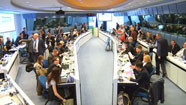On 5 April 2016 the JRC presented the interactive and collaborative online European Energy Efficiency Platform. This beta platform is conceived to fill the gap opened by scattered data and fragmented knowledge resulting from a rapidly growing energy efficiency market. It is expected to be both a one-stop shop for information retrieval and a meeting point for experts to exchange data and reduce redundant activities.
Building Energy Performance and Location – from building to urban area
This report has been produced by the Joint Research Centre (JRC) as a joint activity of several JRC Units. The purpose of this report is to provide insight in the development of methods for the assessment of energy performance of buildings based on geo-location data. The JRC has studied internal documents, project reports together with relevant information available in the public domain.
The presented information is organised in several chapters dealing with different aspects in the study to appropriate methodologies for the assessment. Close collaboration between JRC Units as well as with international projects like the IEA-EBC Annex 71 is presented to clarify the dimension of the undertaken activity. In addition expertise has been brought into the project by contracting an external expert to study a particular part.
An introduction is given to the ELISE Action and the importance of the INSPIRE Directive in relation to the energy performance of buildings. A short introduction is given to the EU Energy Policy programmes and instruments directly related to this project: The energy related EPB and EE Directives and initiatives like CoM and the ELISE programme.
A chapter is devoted to the conclusions of the Energy Pilot project 2016 and presents a classification of approaches to which methodologies can be addressed as well as defined Use Cases to demonstrate selected methodologies. In the context of present EU Energy Policy, the requirements are identified for the development of methodologies.
Support was also given to the development of standards (CEN and ISO) for in-situ measurement methods during several European research projects. Presently the expertise is made available to support the development of energy performance assessment methods based on location data under the ELISE Energy Pilot project.
As an example of the development of a methodology, the Spanish case, taking into account the specific administration data and construction regulation, is presented in a separate chapter.





To quote this publication use the follonwing format: